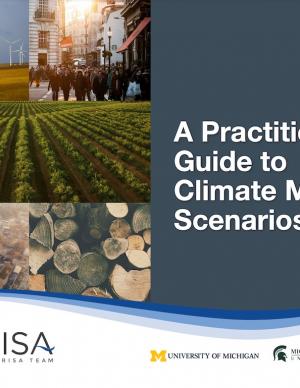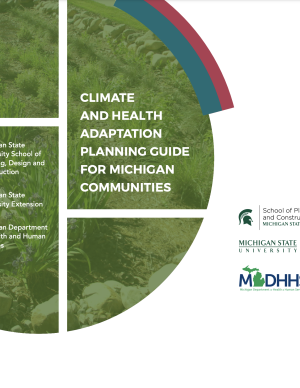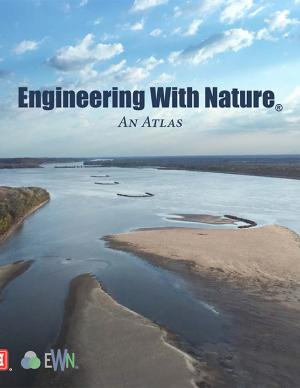Access a range of climate-related reports issued by government agencies and scientific organizations. Browse the reports listed below, or filter by scope, content, or focus in the boxes above. To expand your results, click the Clear Filters link.
This Guide is written for practitioners already using or wanting to use future climate information in their work, but who are not familiar with the underlying assumptions and choices surrounding climate data. Here, we introduce the climate model scenarios that are used to “drive” climate models forward in time. These scenarios are a combination of socioeconomic and climate forcing pathways. We summarize differences between these scenarios for the Great Lakes region to show users how their choice of model scenario affects future temperature and precipitation projections.
Created especially for decision makers and adaptation planners in the Great Lakes region, this report offers planners guidance in developing adaptation plans while navigating local politics and specialized data. Content is accessible for users of all skill levels, with a focus on beginner. The report is divided into six main sections: Climate Change in the Great Lakes Region, Decision Making Under Uncertainty, Climate Information in the Local Planning Process, Data Analysis Guide for Assessing Climate Vulnerability, Building Climate Knowledge and Capacity, and Making the Case.
This guide is intended to help communities in Michigan and across the Great Lakes Region develop a climate and health adaptation plan or to integrate climate and health concepts into existing initiatives. A climate and health adaptation plan is defined here as a strategy document that fosters collaboration across disciplines and interest groups to instigate a series of activities toward the common objectives of understanding and then preventing or reducing the anticipated health impacts of climate change in the area.
The EWN Atlas is a collection of 56 projects illustrating a diverse portfolio of contexts, motivations, and successful outcomes, presented and considered from an Engineering With Nature® perspective to reveal the usefulness of nature-based approaches and the range of benefits that can be achieved. Engineering With Nature is an initiative of the U.S. Army Corps of Engineers enabling more sustainable delivery of economic, social, and environmental benefits associated with water resources infrastructure. EWN intentionally aligns natural and engineering processes to efficiently and sustainably deliver economic, environmental, and social benefits through collaborative processes.
A coalition of 26 businesses, environmental organizations, community groups, and universities in the Detroit area has produced the “Detroit Climate Action Plan.” The proposition intends to address public health and environmental justice issues through a plan that individuals and businesses can practice. The 77-page report contains 20 major goals for the coming years, including calls for the reduction of greenhouse gas emissions by Detroit businesses by 10 percent in the next 5 years, and 80 percent by 2050. Additionally, the plan recommends improvements to the energy efficiency and durability of homes, better stormwater runoff management, expanded use of renewable energy, and broadened recycling and organic waste collection by 2022.
This report, the first of its kind for the City of Grand Rapids, outlines the condition of the city's climate resiliency and offers recommendations for how it can both impact and adapt to climate change. The report's goal is to both spur a larger community conversation around processes that will enable Grand Rapids to become a more climate-resilient city and to spur many specific short- and near-term projects, policies, programs, and plans to mitigate the effects of climate change. The report documents projected local climate changes, their potential negative impact to low-income families, and outlines small near-term solutions that the city can make to curb or adapt to climate change. Recommendations include investing in green space and improving the city's tree canopy, improving the city's energy autonomy, and implementing green street infrastructure materials and maintenance techniques.
The City of Marquette is the largest city in Michigan's Upper Peninsula and one of the most economically diverse in the state. The city is especially vulnerable to environmental, economic, and social impacts of climate change, largely because it borders Lake Superior. A team of Michigan State University Extension specialists and educators received funding from the Great Lakes Integrated Sciences and Assessments Center (GLISA) to collaborate with GLISA researchers, relevant decision makers, and stakeholders in Marquette to increase community resilience through incorporating climate variability and change adaption strategies into local land use master plans and policies. Key stakeholders in the agriculture, forestry, natural resources, health, planning, and tourism fields participated in the development of climate change concerns and strategies. Overwhelmingly, residents and local leaders wanted to protect the natural environment that makes Marquette such a desirable place to live. This report details the process and results of this community-driven process, and also contains specific, detailed GIS maps of the region that reflect the climate vulnerabilities and concerns of the residents and leaders in the Marquette region.
NOTE: This report inspired the creation of another report: "Climate and Health Adaptation Planning Guide for Michigan Communities"










